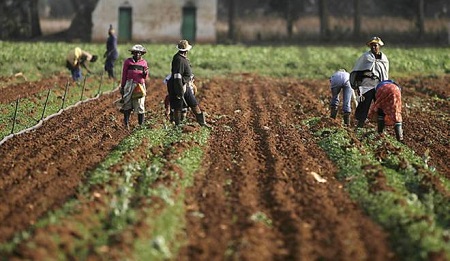ANC`s land expropriation decision an admission of its own failures
The ANC’s decision at its national conference to go ahead with the expropriation of land without compensation is an admission of its own failure to pursue real land distribution, experts say.
The ruling party announced on Wednesday evening that its committee on economic transformation has agreed to amend the Constitution to include land expropriation without compensation.
The new ANC NEC will be given the scope and time to exhaust all tests for sustainability of the policy with no dates or targets having been set. If successful, they will initiate proceedings to amend Section 25 of the Constitution.
Lawson Naidoo, executive secretary of the Council for the Advancement of the South African Constitution (Casac), says the Constitution already provides for expropriation of land under certain conditions but that it’s the ANC’s own failure to pursue this that has led to the slow pace of land redistribution.
“Part of the criticism of the ANC is that they haven’t been able to use the Constitution properly to redistribute land and has instead used it as a convenient excuse for not being able to speed up the process,” he says. The Constitution is not an obstacle to land reform.
Enoch Godongwana, chairperson of the ANC’s committee for economic transformation, concedes this, but says delegates at the party’s national conference felt that the Constitution currently constrains them and that the anger of ordinary South Africans at the slow pace of transformation is what drove the decision to change the provisions of the Constitution.
According to the South African Constitution land or land rights may be expropriated when it is in the public interest and for the benefit of all South Africans. This is, however, currently subject to the payment of just and equitable compensation, although the Constitution does not give an exact explanation of what that entails.
“It has also been determined that it is for a court to decide whether compensation is fair and equitable, and not the Land Valuer-General appointed by the president,” says Theuns Eloff from the FW de Klerk Foundation.
To allow for the expropriation of land without compensation the ANC would have to change the Constitution. For this they need a two-thirds majority in the National Assembly of Parliament when voting on the amendment. The nine provinces in the National Council of Provinces thereafter also need to vote to adopt the amendment.
“It is strange that Cyril Ramaphosa would have this decision made now, given everything he has said in the lead up to the ANC election,” Eloff says. “It might be a case of him picking his battles though, knowing that the party will not have the support to amend the Constitution.”
Daniel Silke, a political analyst, says that “undermining property rights in a reckless manner clearly would affect other economic sectors with a wide knock-on effect on broader economic confidence and sentiment. If that concern is a key caveat then it’s a non-starter.”
“The ANC`s historic policies were largely more radical than those implemented. Even Jacob Zuma kept a lid on the more populist pressures. Now it`s Ramaphosa`s turn to attempt the same,” he says.
Wandile Sihlobo, an agricultural economist and head of agribusiness research at the Agricultural Business Chamber (Agbiz), says in principle, expropriation without compensation is not an ideal way of effecting land reform.
It would generally undermine property rights, investment and the integrity of the land market, and negatively affect both food security and the economy as a whole.
Photo: South African farmers. Source: Focus on Land in Africa.
var cX = cX || {}; cX.callQueue = cX.callQueue || []; var cxwid = 𗪹b93f14c77900c2010e0dc1226375c7c1b1536` // asynchronous cX function call cX.callQueue.push([ `insertWidget`, { widgetId: cxwid, templateElementId: `cx_temp_` + cxwid, targetElementId: `cx_` + cxwid }]); function scrollalert() { var a = $j(#scrollbox); var b = $j(#scrollbox > #content); if (a.length > 0) { if (a.length > 0 && a.scrollTop && b.height() <= a.scrollTop() + a.height() + 20) { $j(#imgAjaxLoad).show(); var data = { `tag`: $j(#hfTag).val(), `tagGroup`: $j(#hfTagGroup).val(), `CurrentSiteId`: 5, `CmsArticleId`: 9d9aa068-19f1-4227-9de1-0d9b419cbe76, `index`: $j(#hfBottomIndex).val(), `selectedArticleIndex`: $j(#hfSelectedArticleIndex).val(), `directionToFetch`: Down }; news24.getAjax(/Ajax/ArticleData/, BuildArticleListByTag, data, onSuccessBottom, onFail) } setTimeout(scrollalert();, 500) } } function onSuccessBottom(a) { var b = parseInt($j(#hfBottomIndex).val()); if (a != && a != null) { $j(#hfBottomIndex).val(b + 5); setTimeout($j(`#imgAjaxLoad`).hide();, 1e3); var c = $j(#RelatedLinks).html() + a; $j(#RelatedLinks).html(c) } else { setTimeout($j(`#imgAjaxLoad`).hide();, 1e3); $j(#hfBottomIndex).val(-1) } } function onSuccessTop(a) { var b = parseInt($j(#hfTopIndex).val()); if (a != && a != null) { $j(#hfTopIndex).val(b - 5); setTimeout($j(`#imgAjaxLoad`).hide();, 1e3); var c = a + $j(#RelatedLinks).html(); $j(#RelatedLinks).html(c); $j(#scrollbox).scrollTo(10) } else { setTimeout($j(`#imgAjaxLoad`).hide();, 1e3); $j(#hfTopIndex).val(-1) } } function onFail() { } $j(document).ready(function () { scrollalert(); $j(#imgAjaxLoad).hide() }) Related articles:
Mmusi Maimane: Treatment of black farmers shows the sham of ANC `empowerment`
It`s not as simple as `giving back the land`
Why we need radical economic transformation
Land Restitution in South Africa since 1994
Four scenarios of land reform in South Africa














